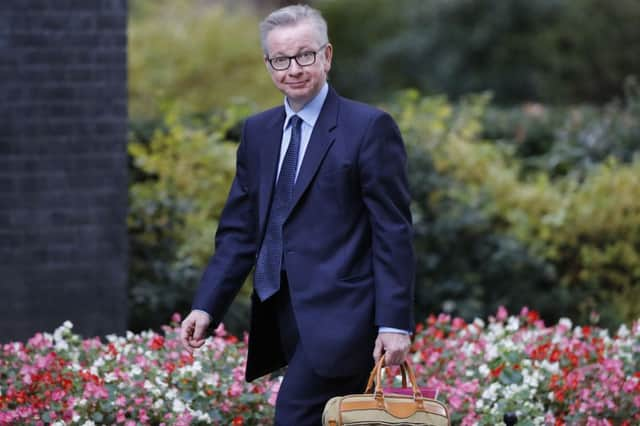Brexit: PM's red lines on fishing have been defended, says Gove


Speaking during the second reading debate on the Fisheries Bill, Mr Gove said: “We were told at different times that we would have to bend or buckle when it came to fisheries, the Prime Minister and the negotiating team have absolutely not.”
But Tory former minister Mark Francois said he found it “difficult to take seriously the commitments that the Prime Minister now gives to this House”.
Advertisement
Hide AdAdvertisement
Hide AdMr Gove said: “It is the case that there is an acknowledgement on the part of EU nations that UK negotiators have safeguarded access to our waters, secured our status as an independent coastal state and the initial negotiating mandate of the EU has not been satisfied in these negotiations with respect to fisheries but the red lines laid down by our Prime Minister have been defended.”
Mr Francois said: “The Prime Minister has told the House on numerous occasions that we would leave the customs union and yet the withdrawal agreement envisages very clearly that we would remain in the customs union under the backstop and that having entered we couldn’t leave unless the EU consented, the so called Hotel California arrangement.
“The Prime Minister also assured the House in very strong terms that she would never contemplate a border down the Irish Sea and yet in the agreement including the Northern Ireland protocol exactly that is envisaged.
“I regret to say, given that, I find it difficult to take seriously the commitments that the Prime Minister now gives to this House. If I have trouble believing her why should I believe him?”
Mr Gove said there was a “widespread recognition” that the Common Fisheries Policy (CFP) did damage.
He said: “Whatever position we may have taken in that referendum, taking back control of our waters, leaving the CFP and becoming once again an independent coastal state gives us an opportunity to lead environmentally, to revive the fishing industry economically and to make sure that our coastal communities once more have the opportunity of a renaissance.”
SNP trade spokesman Stewart Hosie (Dundee East) warned that given the UK’s “negotiating failure” so far, what the UK would end up with “will look very similar to the terms of the CFP”.
Mr Gove denied the claims and said the UK will be negotiating as an “independent coastal state” at the December 2020 fisheries council.
Advertisement
Hide AdAdvertisement
Hide AdConservative Martin Vickers (Cleethorpes) later told Mr Gove: “He will know that the industry have long memories and they can remember the last minute sell-out in the original common market negotiations, and they still fear that that is going to happen again.”
Mr Vickers asked for assurances that “under no circumstances will further concessions be granted”, and Mr Gove told him: “There’s no way I can ever forget what happened then, and no way that I will be anything other than a resolute champion to the interests of coastal communities like the one that he serves and represents so admirably.”
The Cabinet minister went on to say the Government would introduce an approach that means fisherman can catch and land, but if they exceed the discard ban then they will “pay a penalty that will ensure that we have a sustainable approach towards fisheries”.
And he said: “This Bill will allow us to decide who catches what and where and in line with what environmental principles.”
Shadow environment secretary Sue Hayman said Labour would not oppose the Bill at second reading, saying: “It’s turned out to be a mostly enabling Bill for making future decisions.
“However it is clear that the Government has some way to go before we can all be satisfied with what is before us today.”
SNP environment spokeswoman Deidre Brock later told MPs the promise of leaving the CFP was nothing more than a “conjurer’s trick”.
She said: “The common fisheries policy will carry on regulating our fishing fleets after we leave the EU, taking back control has never sounded so hollow.
Advertisement
Hide AdAdvertisement
Hide Ad“The Secretary of State spoke to leaders of the Danish industry last year and guaranteed them continued access to our waters after Brexit, the UK embassy in Spain was reassuring Spanish trawlers earlier this year that their access to UK waters was assured.
“The withdrawal bill replaces common decision-making on the CFP as a member of the EU with CFP rules handed down from Brussels and no input from ministers from these isles on behalf of the industry here.
“Well done those Brexiteers, you certainly did land a whopper there.”
